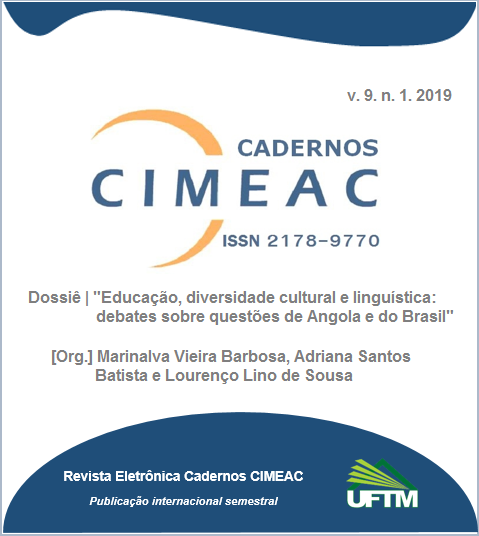Pensamento crítico: um grande desafio para o professor angolano na universidade / Critical thinking: a great challenge for the Angolan teacher at the university
DOI:
https://doi.org/10.18554/cimeac.v9i1.3876Resumen
O objetivo deste artigo é fomentar o debate sobre a importância do desenvolvimento do pensamento crítico nos estudantes de graduação em Pedagogia no Instituto Superior de Ciências da Educação-Cuanza Sul. Baseando-se nos resultados da pesquisa, foi desenvolvida uma estratégia didática enfocando o processo de ensino-aprendizagem e os problemas profissionais do professor e do futuro professor, que estruturou-se desde a Didática como conteúdo do trabalho científico-metodológico e como fonte integradora do currículo. Foi proposta uma prática para investigar a necessidade sobre a reflexão docente crítica e ativa desde o desenho curricular. Desse modo, buscou-se em autores como Ennis, R. H. (1987); Richard, Paul (1993); Piette (1996); Lipman, Matthew (1988); e outros que debatem o pensamento crítico, elementos para a realização da investigação e empregou-se o enfoque dialético materialista na sua condição de método científico. Problematiza-se, então, compromissos e desafios do docente para afrontar a passividade dos estudantes, bem como desenvolver as potencialidades e capacidades de analisar, avaliar, interrogar, investigar, argumentar e experimentar, de modo que esses possam tornar-se sujeitos ativos na sala de aula. Os docentes que atuam na licenciatura devem comprometer-se com o desenvolvimento das capacidades de pensamento nas suas práticas de ensino aos futuros profissionais da educação, preparando-os para a vida, de modo que possam intervir e agir para a transformação da realidade, em favor de uma sociedade mais justa, mudando para uma ação destinada a preparar as pessoas para uma melhor inserção no mercado de trabalho ou para um melhor e mais adequado aproveitamento das oportunidades oferecidas.
Palavras-chave: Pensamento crítico; Desenvolvimento; Formação; Ensino e aprendizagem.
ABSTRACT: The purpose of this article is to promote the debate about the importance of the development of critical thinking in graduation students in Pedagogy at the Higher Institute of Educational Sciences-Cuanza Sul. Based on the research results, a didactic strategy was developed focusing on the teaching-learning process and the professional problems of the teachers, structured from Didactics as a content of the scientific-methodological work for the curriculum. It was proposed a practice to investigate the need for critical and active teacher reflection from curriculum design. We sought authors like Ennis, R. H. (1987); Richard, Paul (1993); Piette (1996); Lipman, Matthew (1988); and others who debate critical thinking, elements of the research, and the materialist dialectical approach, that was employed as a scientific method. The teacher's commitments and challenges are then problematized to confront student passivity, as well as to develop the potentialities and capacities to analyze, evaluate, interrogate, investigate, argue and experiment, so that they can become active subjects in the classroom. Teachers who work in the graduation must commit themselves to the development of the thinking capacities in their teaching practices to the future professionals of education, preparing them for life, so that they can intervene and act for the transformation of reality in favor from a more just society, shifting to an action designed to prepare people for a better insertion in the labor market or for a better and more adequate use of the opportunities offered.
Keywords: Critical thinking; Development; Teaching and learning.
Descargas
Publicado
Número
Sección
Licencia
Os autores que publicam nesta revista concordam com os seguintes termos:
(a) Não cobramos dos autores para a publicação neste periódico.
(b) Autores mantém os direitos autorais e concedem à revista o direito de primeira publicação, com o trabalho simultaneamente licenciado sob a Licença Creative Commons que permite o compartilhamento do trabalho com reconhecimento da autoria e publicação inicial nesta revista.
(c) Autores têm permissão e são estimulados a difundir e a distribuir a versão publicada de seu trabalho online (ex.: em repositórios institucionais ou na sua página pessoal) após o processo editorial, já que isso pode aumentar o impacto e a citação do trabalho publicado (Veja O Efeito do Acesso Livre).
* * *
AUTHORS COPYRIGHT AND PUBLISHING RIGHTS
Authors who publish with this journal agree to the following terms:
(a) This journal does not charge authors for publication.
(b) Authors retain copyright and grant the journal right of first publication with the work simultaneously licensed under a Creative Commons Attribution License that allows others to share the work with an acknowledgement of the work's authorship and initial publication in this journal.
(c) For authors whose articles have been accepted: authors are permitted and encouraged to post their work online (e.g., in institutional repositories or on their website) after the publication of the text in Cadernos CIMEAC, as it can lead to productive exchanges as well as earlier and greater citation of published work (See The Effect of Open Access).

 10.18554/cimeac
10.18554/cimeac

